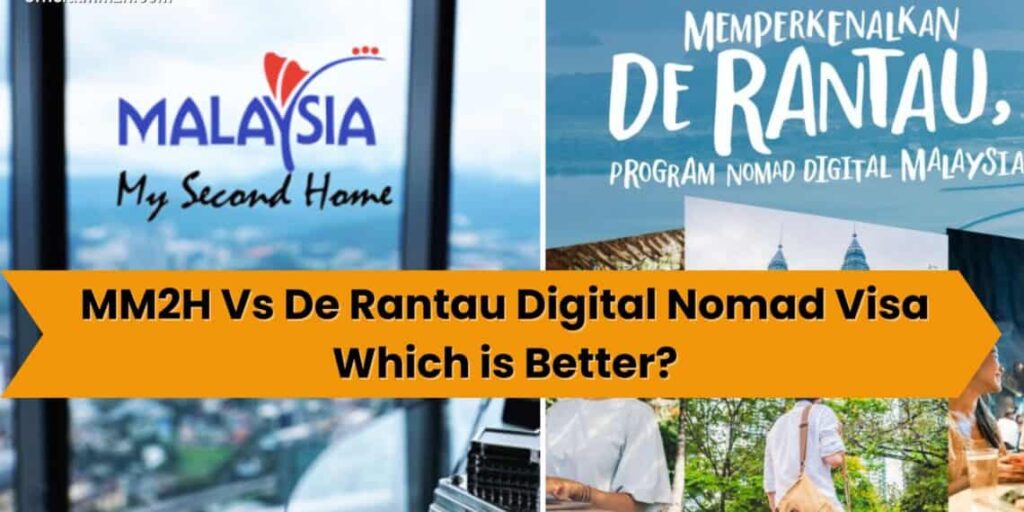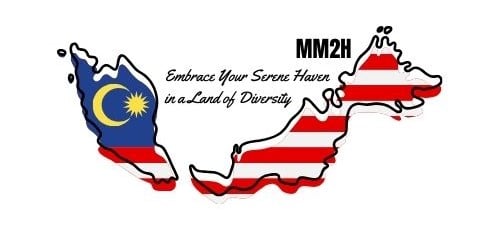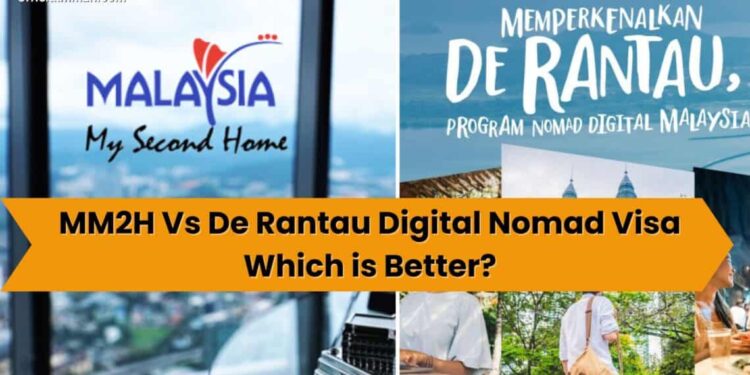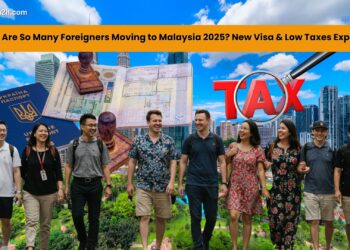Malaysia: MM2H Vs De Rantau Digital Nomad Visa Comparison
Choosing the right visa for living and working in Malaysia can feel like dealing with a confusing labyrinth. Trust me, I know how overwhelming it can be. But after immersing myself in all the details and options, I’ve discovered some clear pathways through the maze.
This article will spotlight two enticing options for foreigners: the MM2H program and the De Rantau Digital Nomad Visa. We’ll explore their features, eligibility requirements, and benefits to help you figure out which one might be your perfect match.
Let’s unpack this puzzle together.
Key Takeaways
- The MM2H program is a long-term visa lasting up to 5 and 15 years renewable visa based on category you choose, with benefits like tax incentives and the right to buy property. It requires proof of financial stability and offers healthcare access along with education options for kids.
- De Rantau Digital Nomad Visa allows remote workers to live in Malaysia for 3-12 months, extendable by another 12 months. Applicants must prove they earn at least $24,000 annually. This visa costs 1,000 MYR (about USD 218) and can be applied for online.
- While MM2H suits those looking for a longer stay or possibly retiring in Malaysia with family dependents allowed, De Rantau is ideal for digital nomads aiming for shorter stays but still wanting the experience of living and working in Malaysia.
Overview of MM2H vs De Rantau Digital Nomad Visa

So, you’re eyeing Malaysia as your next stop? Cool thing is, there are two main ways to make that happen: the MM2H program and the De Rantau Digital Nomad Visa. The MM2H, or Malaysia My Second Home, lets people live in this lively country for a long time.
On the flip side, the De Rantau pass is pretty new and perfect for remote workers who want to enjoy Malaysia while still clocking in hours for work elsewhere. Both have their own set of rules about who can apply and what benefits you get once you’re in.
Key features of MM2H
I’ve been looking into Malaysia’s MM2H program, which stands for Malaysia My Second Home. It caught my eye because it offers a lot of perks for people wanting to stay in Malaysia long-term. Here’s what I found about its key features:
- Validity up to 5 and 15 years renewable visa: This long-term visa lets you live in the beautiful country of Malaysia with less worry about renewing your stay often.
- Tax incentives: Living under this program means you get some sweet deals on taxes, making it easier on your wallet.
- Proof of financial self-sufficiency: You need to show you have enough money to live there without working locally. This proves you won’t be a burden on their system.
- Access to healthcare: Getting sick isn’t so scary because you can use Malaysia’s healthcare services, which are pretty good.
- Education opportunities: If you’ve got kids, they can go to school here just like local children or choose from international schools.
- Right to buy property: Dreaming of owning a home in a tropical paradise? MM2H makes this possible without jumping through too many hoops.
- No need to pay income tax on money brought into Malaysia from other countries: This is great for digital nomads or those retired, keeping more money in your pocket.
- Application fee involves some paperwork but is straightforward, and once approved, you’re all set to explore life in Southeast Asia’s gem.
I was impressed by the balance between the welcoming stance towards foreigners and ensuring they contribute positively to living in Malaysia responsibly and sustainably.
Key features of De Rantau Digital Nomad Visa
Malaysia recently rolled out the De Rantau Digital Nomad Visa. It’s a game-changer for folks like me, looking to live and work in an exciting new place. Here are the key aspects you need to know about this visa:
- Length of Stay – You can stay in Malaysia for 3-12 months on this visa. If things go well, you can even ask to stay longer, up to an extra 12 months.
- Minimum Income – To get this visa, you need to show you make at least $24,000 a year. This helps ensure that digital nomads can support themselves while they’re here.
- Visa Fee – Applying for this visa costs 1,000 MYR, which is around USD 218. It’s a small price to pay for the chance to explore Malaysia.
- Online Application – You can fill out the application form online. It makes applying easy because I can do it from anywhere.
- Upload Your Passport Photo – Along with the online form, you just upload your passport photo and other needed documents.
- Professional Visit Pass – This is what they give you when your De Rantau application is successful. It’s your ticket to entering Malaysia as a digital nomad.
- Chance to Work Remotely – With this visa, I have the freedom to work from anywhere in Malaysia; whether it’s a beach in Penang or a cafe in Kuala Lumpur.
- Attract Digital Nomads – Malaysia launched this program not just as an entry pass but as an invitation for global digital nomads like me to join their local community.
With all these features combined, De Rantau Digital Nomad Visa stands out as a perfect option for anyone ready to take their remote work life on an adventure in Malaysia!
Eligibility Requirements

To get into Malaysia’s MM2H or De Rantau, you need to fit their rules. For MM2H, you show money and health info. For De Rantau, you must work online and make enough money each month.
Criteria for MM2H
To get into the MM2H program, I need to show that I have enough money to live well in Malaysia. It’s key for me to prove I won’t be a burden on Malaysia’s economy.
Also, this visa lets me buy my own place to live, which is great because property here can be quite affordable compared with back home.
I also found out that the MM2H visa lasts a long time—it gets renewed every 5 or 15 years depends on what category we choose! Plus, it covers education and healthcare access for me and any family coming along. So, if I move here with kids or plan to have them while living in Malaysia, they are set for school.
And if anyone gets sick, we’re covered; the healthcare system here is pretty solid.
MM2H: More than just a stay–it’s your gateway to Malaysia.
Criteria for De Rantau Digital Nomad Visa
For the De Rantau Digital Nomad Visa, I need to show I earn at least $24,000 a year. This means showing proof of my income and where I work. They also want to make sure I follow the law, so a clean criminal record or a letter saying I’m good is needed.
The whole thing happens online. I go to the DE Rantau Digital Nomad Pass site and fill out my application there.
It’s pretty cool that Malaysia offers this. With this pass, living as a digital nomad in Malaysia becomes easier for people like me who work online and travel. The program lets us enjoy Malaysia’s digital environment without worrying too much about paperwork.
Plus, it’s open to lots of different kinds of people who make their money from the internet – whether they’re into digital marketing or creating content online.
Benefits Comparison
Deciding between MM2H and De Rantau Digital Nomad Visa? Each program offers specific perks. MM2H is great for those looking to stay longer in Malaysia with family, as it lets you bring dependents.
On the flip side, the De Rantau Digital Nomad Visa works well if your work is online and you love traveling, offering an attractive option to live in Malaysia while working on your global projects.
Advantages of MM2H
I’ve been looking into Malaysia as a great country to live, especially for digital nomads like me. The MM2H program caught my eye for its unique benefits.
- Tax incentives are a big plus. Malaysia offers friendly tax rules which means I can save more of what I earn.
- Access to healthcare is another advantage. The country has high-quality healthcare services that are affordable.
- Being able to buy property here is huge. Not many countries offer this perk to foreigners.
- The visa lasts a long time – it’s renewable every 5-15 years. This gives me peace of mind and stability.
- I love that dependents can join me. It’s great for families or if you have someone you care for.
- The cost of living in Malaysia is low compared to other digital nomad hubs. This means my money goes further here.
- English documents or translated ones are accepted, making the visa application process easier for people from all over the world.
- Lastly, being part of MM2H means joining an established community of expats and locals who share valuable insights and tips about living in Malaysia.
Advantages of De Rantau Digital Nomad Visa
Living in Malaysia has its perks, especially with the De Rantau Digital Nomad Visa. This program opens doors for digital nomads like me to enjoy a variety of benefits while working remotely from this beautiful country.
- No tax on income earned outside Malaysia, meaning more money stays in my pocket.
- The cost of living here is low. I can live comfortably in cities like Kuala Lumpur for $1,612 a month or even less in Penang for $981.
- I get access to coworking spaces. These places are perfect for meeting other digital nomads and finding all the services I need to work effectively.
- Bringing my family along is easy since the visa allows me to include my spouse and kids under 18.
- Applying online makes the process simple. I just fill out a form from anywhere outside Malaysia.
- The Malaysian Digital Economy Corporation backs this visa, ensuring it’s created to fit the needs of people like me who work online.
- I can enjoy my stay without worrying about visa issues too soon.
- Opportunities around English content development and digital marketing are part of what make this program so valuable for someone with my skills.
So here FAQ about De Rantau Digital Nomad pass which taken from Malaysia Digital Economy Corporation (MDEC) Sdn Bhd website at https://mdec.my/derantau.
These features make living and working in Malaysia an attractive choice for digital freelancers and independent contractors seeking a balance between work and lifestyle not found in many other countries.
Conclusion

Choosing between MM2H and De Rantau Digital Nomad Visa depends on what you’re looking for. If you want to live in Malaysia for a long time, maybe even retire here, MM2H might be your best pick.
It lets you stay up to 5-15 years! On the other hand, if you’re like me, always on your laptop, moving from place to place, then De Rantau is perfect. You can live in Malaysia for up to two years while working online.
Plus, both have cool benefits like tax breaks and healthcare access. So think about what fits your life better and go for it!





Hi,
I am currently in my 2nd year of digital nomad visa and while this was initially a somewhat unclear topic, it has by now been clarified that remote work carried out from Malaysia is actually treated as income sourced in Malaysia in therefore taxable under normal income tax rate. If you have other information, I would be interested in seeing your sources, because both MDEC and LHDN Malaysia (tax authorities) have confirmed tax liability.
Regarding MM2H, I have read that one is not allowed to work under this visa – but I have been wondering if this only includes work for local companies or remote work as well?
Regarding tax exemption, it seems to be a similar case as with the digital nomad visa because it says the exemption is “on funds brought into Malaysia”, which sounds like passive income to me.
If you have talked to authorities and have more information I would be very curious to know more!
Best Regards,
Laura
Hi Laura,
Thanks for sharing your experience! You’re right about the digital nomad visa; income from remote work performed in Malaysia is considered taxable by the LHDN at standard income tax rates. Regarding the MM2H program, participants aren’t allowed to work in Malaysia (except platinum category), which generally includes both employment with local companies and remote work if it’s recognized as income sourced in Malaysia.
For the tax exemption under MM2H, it indeed applies to funds brought into Malaysia, typically seen as passive income like pensions. For the most accurate and up-to-date information, I’d recommend consulting directly with Malaysian immigration and tax authorities or a professional advisor. If I find more detailed insights, I’ll be sure to share them with you!
Best Regards.